MISSION JUSTICE
The campaign to stop sexual violence by UN Peacekeepers
|
The United Nations Association – UK (UNA-UK) will use its commemoration of the International Day of UN Peacekeepers – the biggest of its kind in Europe – to release a six-point action plan for tackling sexual exploitation and abuse (SEA) by UN peacekeepers.
180 experts and practitioners will attend a day-long conference on 24 May at which they will hear presentations from Hilde F. Johnson, former Special Representative of the UN Secretary-General and Head of the United Nations Mission in the Republic of South Sudan (UNMISS) and Major General (retired) Patrick Cammaert, former General Officer Commanding, East Division, United Nations Organization Mission in the Democratic Republic of the Congo (MONUC), and the author of the Independent Special Investigation into the violence which occurred in Juba in 2016 and UNMISS response. The conference is organised jointly with the Royal United Services Institute (RUSI) and our Westminster branch. At 1300, a memorial service will be held at the cenotaph at which Alok Sharma, Parliamentary Under-Secretary of State, Foreign & Commonwealth Office, General Sir Christopher Deverell, Commander of Joint Forces Command of the United Kingdom, other VIPS, and representatives of the embassies and high commissions of over 110 countries will lay wreaths to commemorate fallen peacekeepers. Last week, UNA-UK polled its nationwide supporter base and found that 88% think that not enough has been done to prevent SEA by UN peacekeepers. This is despite a 20+ year process of reform at the UN, culminating in a new task force and report from the UN Secretary-General in April of this year. But reform needs to stretch beyond the UN. Indeed, only 29% of respondents felt that the UN Secretary-General and Department for Peacekeeping Operations should do more. By contrast, 71% felt that the countries that contribute peacekeeping troops must take responsibility. Peacekeepers remain under the jurisdiction of their country, not the UN, which can therefore take only limited action. UNA-UK’s Mission Justice campaign calls for states to live up to their responsibility to prosecute criminal acts of sexual exploitation and abuse. Released today, our six-point plan calls for states to act on six measures that will help countries to prosecute peacekeepers that fall under their jurisdiction, and to ensure the international community steps into the gap when they do not. Natalie Samarasinghe, Executive Director of UNA-UK, said, “Sexual abuse destroys lives. Sexual abuse in conflict destroys communities. Sexual abuse by peacekeepers destroys trust – putting at risk the country’s future and even peacekeeping itself. “We believe passionately in peacekeeping. We also believe passionately in listening to, and helping, victims of abuse. That is why we are launching this campaign. “Multiple attempts at reform, dating back several decades, have seemingly not led to a marked reduction in the nature or severity of allegations. We believe this is because they are constrained by the structural and systemic immunity peacekeepers enjoy. If peacekeepers believe they will not be prosecuted it fosters a climate of impunity and severely curtails the impact of the commendable steps taken by the UN Secretary-General. “This is a shared responsibility. It falls in the first instance to the states that deploy peacekeepers to prosecute. If these states are not able to live up to their responsibility then the international community, and the UN, should help them to do so. If this too is unsuccessful, then the international community must step into the gap.” Launching his own report into the issue last month, UN Secretary-General António Guterres said, “Such acts of cruelty should never take place. Certainly, no person serving with the United Nations in any capacity should be associated with such vile and vicious crimes. Let us declare in one voice: We will not tolerate anyone committing or condoning sexual exploitation and abuse. We will not let anyone cover up these crimes with the UN flag.” Photographs will be live tweeted over the hashtag #Peacekeepers17 Read our six point plan
1 Comment
Part of our regular series of background briefings on the UN in the news. Peacekeeping is in the news. President Trump wishes to cut funding to the UN for peacekeeping. Tough negotiations reduced the UN presence in Haiti, and, by a smaller amount, in the Democratic Republic of Congo. Allegations of sexual abuse persist. Against this backdrop on Wednesday UNA-UK will join with UNA-Westminster and the Royal United Services Institute (RUSI) for a day long conference and Europe's largest ceremony commemorating peacekeepers. What is it all about? What is peacekeeping? Peacekeeping is an intervention into an area of instability in order to facilitate the transition of that area back towards peace. Peacekeepers can be civilians and are frequently police officers, but the majority of peacekeepers are armed military personnel. Peacekeeping is not only performed by the UN. The African Union (AU) has several active peacekeeping missions, in addition to joint missions with the UN. The EU, NATO, member states such as France, and ad-hoc coalitions such as the 'Multinational Force' in the Sinai have also conducted peacekeeping missions of one form or another. What can UN peacekeepers do? The role of UN peacekeepers is to enforce a mandate given to them by the UN Security Council. Peacekeepers can therefore do as much or as little as the Security Council resolution allows them. These resolutions are adapting with the times. The traditional role of a peacekeeper was to observe the ceasefire line in a frozen conflict, and in a minority of missions (Cyprus and South Lebanon) that is still the case, but most missions are now more complicated than this. An emergent norm from subsequent generations of peacekeeping missions was that the role of a peacekeeper was to extend the legitimate authority of the state. But in some of the increasingly fragmented and fragile conflicts where peacekeepers currently operate, the state cannot be thought of as a singular entity, and its legitimacy is not beyond question. Nowadays the role of the peacekeeper is often to protect civilians, including by the use of force, in situations where there is limited peace to keep. This requires a new kind of mandate. Traditionally peacekeeping has relied upon three principles:
However, these principles now have to be interpreted creatively. Increasingly peacekeepers are given mandates which allow them to to robustly protect civilians, even if this means using force to prevent the loss of civilian life. However, it is still clear that peacekeepers are not peace enforcers, and that when there is truly no peace to keep the efficacy of peacekeeping missions is far more limited. Current operations Currently the UN deploys just over 113,000 peacekeepers: 82,700 armed troops, just under 12,000 police, nearly 2,000 military observers, 5,000 international civilian personell, around 10,000 local staff and 1,500 volunteers. Around 4,000 peacekeepers are women. 124 different countries contribute these personnel. They are reimbursed for doing so, and are supported by the UN Department for Peacekeeping Operations, however, the contributing country retains responsibility for uniformed personnel's conduct, and can ultimately determine where they are sent and what tasks they perform. Ethiopia, India, Pakistan, Bangladesh and Rwanda are the primary troop contributors. How much does it cost and who pays? Peacekeeping costs around $7.9 billion a year. To put that number into context, this represents less than 0.5% of global military spending. The cost to the UK is around $450 million, around £5.30 - the cost of a pricey pint - per person per year. UN peacekeeping represents very good value for money. The cost of deploying a UN troop is over 80 times less, than that of deploying - for example - an American troop to perform the same task. The cost of peacekeeping is shared between member states according to a special formula. The amount that states contribute to the UN budget (itself the result of a separate formula based upon ability to pay) is taken as a starting point. Then less wealthy nations are given progressively larger discounts based upon their relative wealth. These discounts are paid for by charging a premium to permanent members of the UN Security Council (the UK, US, China, Russia and France) in recognition of the greater responsibilities that come with their greater degree of control over peacekeeping. Does it work? Yes. Recent positive examples of peacekeeping include Liberia and Sierra Leone, while the situation in Mali, the Central African Republic and the Democratic Republic of Congo is considerably improved as a consequence of the UN's intervention. Several academic studies have determined that the presence of peacekeepers significantly reduces the risk of renewed warfare, and that the more peacekeeping troops and police deployed, the fewer the civilian deaths. A study by the Rand Corporation concluded that: "the UN success rate among missions studied (seven out of eight societies left peaceful, six out of eight left democratic) substantiates the view that... the UN provides the most suitable institutional framework for nation-building missions that require fewer than 20,000 men; one with a comparatively low cost structure, a comparatively high success rate, and the greatest degree of international legitimacy" Lord Wood of Anfield, Chair, United Nations Association - UK
Over the next six months, the UN will wind up its peacekeeping mission to Haiti – the United Nations Stabilization Mission in Haiti (MINUSTAH) – withdrawing nearly 5,000 uniformed personnel, the majority of them police. A new, lighter, mission consisting exclusively of 1,275 police officers will take its place. That mission will be known as the UN Mission for Justice Support in Haiti (MINUJUSTH). The UN has had a continuous military presence in Haiti for nearly 25 years. The current mission has been in place since 2004 and is one of the UN’s most controversial. Initially tasked with restoring stability and security following the coup d’état against former President Aristide, the horrendous earthquake of 2010 (which is estimated to have killed some 220,000 people, including 96 UN peacekeepers) saw a shift in focus to reconstruction and infrastructural support efforts. But this work has been marred by repeat allegations of sexual exploitation and abuse, leading in 2007 to the largest single repatriation in UN history, when 119 Sri Lankan troops were sent home for participating in a child prostitution ring. Meanwhile an outbreak of cholera – a disease which had not been present in Haiti for over 100 years, and which killed nearly 5,000 people in 2010 – was traced back to a failure by a Nepali contingent to sanitise waste water. These incidents led to a significant breakdown in trust between the mission and the local community. They also provoked debate as to whether an armed peacekeeping force was the best way to support a country in need of political stability, development aid and security sector reform – a country that has not experienced armed conflict for over a decade and which has seen democratic transfers of power (albeit marred by violence, corruption and delays) since. Many wondered why the mission did not wind up at those junctures – would it continue indefinitely, regardless of the situation on the ground? It is therefore right that MINUSTAH will end. Compensation must be paid, ongoing support must be assured, and lessons must be learned for future missions when it comes to people-centred peacekeeping and – crucially – preventing sexual abuse. Our Mission:Justice campaign seeks to tackle that very issue. It is also sensible that the UN’s involvement in Haiti will not cease. The replacement mission seems a much more suitable means to strengthen Haiti’s rule of law and support its governance. But we must be careful not to draw the wrong lessons from MINUSTAH’s unhappy record. As UN peacekeepers in some of the world’s most challenging situations prove every day: when given the right mandate, the right troops, the right approach and the right capacity the ‘blue helmets’ are unmatched in their ability to protect civilians and prevent a return to war. While peacekeeping failures inevitably receive greater attention than ongoing successes, studies have shown that UN missions are generally more effective and substantially cheaper than comparable interventions. The Rand Corporation, a US think tank, analysed eight UN peacekeeping missions and found that: UN missions are nearly always undermanned and underfunded, with uneven troop quality and late-arriving components. But despite these handicaps, the UN success rate among missions studied (seven out of eight societies left peaceful, six out of eight left democratic) substantiates the view that … the UN provides the most suitable institutional framework for nation-building missions that require fewer than 20,000 men-one with a comparatively low cost structure, a comparatively high success rate, and the greatest degree of international legitimacy As the UN calls time on one of its hardest and most controversial missions, we should scrutinise the circumstances under which peacekeepers are deployed and ask what factors – successes and failures – should trigger their withdrawal. UN peacekeeping is not a silver bullet. Time and again we have seen that missions are most effective in countries like Liberia and Sierra Leone where an external military presence can alter the balance of power in favour of the forces of stability, and is most effective when big powers show sustained interest and support. But there can be no doubt that UN peacekeeping will continue to play an important a role, providing support where others cannot and will not. In the right circumstances it is an unmatched tool for building sustainable peace. Photo: Members of the Brazilian contingent of the United Nations Stabilization Mission in Haiti (MINUSTAH). Copyright UN Photo/Marco Dormino UNA-UK's Head of Policy, Fred Carver, appeared on Al Jazeera English on 11 April 2017, encouraging UN peacekeeping reform in light of recent reports of sexual abuse and violence committed by troops in Africa and Haiti.
In the interview with Al Jazeera, Fred underlined the failure of the United Nations to get to grips with the problem of sexual exploitation and abuse by UN peacekeepers. While reform of UN peacekeeping with regards to abuse allegations has been on the UN's radar for over 20 years, a fundamental lack of accountability mechanism has prevented any reform agenda from curbing abuse on the ground. Additionally, Fred emphasised the importance of proper implementation of UN peacekeeping mandates to protect civilians, especially those who are under attack. This involves not only drafting robust mandates, but also hiring the right troops to implement those mandates. There is a case to be made that peacekeeping could be better achieved by fewer but better trained troops. But financially, peacekeeping does provide very good value for money. The UN’s 112,000 peacekeepers operate in fraught regions across the globe, protecting civilians from violence and promoting conditions for lasting peace. However, acts of sexual abuse and violence perpetrated by a small number of UN peacekeepers are not only proving detrimental to victims, but also violating community trust in peacekeepers and weakening the legitimacy of the United Nations. UNA-UK’s Mission:Justice campaign advocates for decisive action to combat this abuse. We believe that the responsibility to prosecute sexual violence and bring the perpetrators to justice should be an international standard. UNA-UK urges the UN and its member states to work together to strength the global system’s ability to respond effectively, remove the obstacles to prosecution and demand justice. Princess Tessy of Luxembourg is a former officer in the Luxembourg army and a newly-appointed Patron of UNA-UK. She has described the "highlight" of her five-year military career as her deployment with the UN peacekeeping mission in Kosovo in 2004. After military service, she became the global advocate for young women and adolescent girls at UNAIDS, before being nominated as Associate Fellow for the Centre on Global Health Security at Chatham House.
Her Royal Highness sat down with UNA-UK’s Head of Policy, Fred Carver, for a wide-ranging interview about the UN, peacekeeping and our latest campaign, Mission:Justice, calling for greater accountability for crimes of sexual abuse committed by UN peacekeepers. So, how did you become interested in the United Nations? It started when I was in the military but developed when I started my studies at SOAS, University of London. The UN is an institution unlike any other. It's a very strong institution which, as we all know, needs some reform. However, most importantly I believe in its strength in unifying 193 countries under one umbrella. My interest has increased dramatically over the last year and a half as I got involved with UNAIDS and then UNA-UK shortly after that. I feel very privileged to be a part of this organisation. What do you think the UN contributes to the world? The UN unites countries for one goal: to facilitate diplomatic processes. This means the UN strengthens alliances between civilizations; it works best not through hard power, but via the tools of diplomacy. Obviously, we need reforms to adapt with the times, but the UN is still very relevant. What do you think needs to change to bring UN peacekeeping into the modern era? As with many institutions, the problem is the bureaucracy and the effects of internal lobbying. Moreover, allegations of sexual violence and a failure to punish the perpetrators has lowered the UN peacekeeping programme’s reputation. Looking back on my experience, I think it is hard to get women into peacekeeping because it is hard to get women to join the army in the first place. Addressing sexual violence is also necessary. One needs to acknowledge that sexual violence is also committed against men in conflict, but people don't talk about that. Once you scratch the surface, you see that everything is more complicated than it first seems and the challenges faced by male and female peacekeepers are quite similar. We need an approach to gender in peacekeeping which understands both the similarities and the differences. Do you see sexual abuse as a form of systematic oppression, and if so, what message do you feel that UN peacekeepers are sending by being complicit in such a process? No, sexual abuse is not always a form of systematic oppression. The reality is that there are many forms of sexual violence. I don’t think it is possible to explain why this is happening; it is a very complex subject. I would prefer to avoid any simplification of very complex topics such as sexual violence. However, it could involve many factors: cultural, group dynamics, psychopathology, quality of supervision and mental health maintenance while deployed, and so on. That is why our campaign is so important. I still believe the UN is a very strong institution. And that's why I am proud to have been part of it. Why did you decide to get involved with the United Nations Association – UK? In short, I wrote you an email because you were organising a peacekeeping event. As a former peacekeeper I found your event incredibly compelling. Afterwards I got to know your Executive Director, Natalie Samarasinghe, and she spoke to me about the value of me telling my story. As a result you kindly facilitated me in telling that story to the Daily Telegraph. So I came as a participant at a conference and the work was powerful enough that I stayed as a Patron. What do you think is the value of UNA-UK? I think the value is enormous because UNA-UK has the ability to increase the dialogue between the UK and the UN. Your advocacy projects and campaigns facilitate constructive communication for difficult topics such as sexual abuse. Photo: Princess Tessy (centre), while serving in Kosovo in 2004. Credit: Courtesy of Princess Tessy of Luxembourg Secretary-General António Guterres has today presented the report prepared by his high-level task force on preventing sexual exploitation and abuse by UN peacekeepers.
The report will call for a joined-up approach to combatting sexual exploitation and abuse, looking to ensure the United Nations and the countries that contribute peacekeepers work together to address the problem. This approach is welcome, and represents a positive start to the Secretary-General’s pledge to address the issue. We look forward to supporting the Secretary-General in building on this report and taking the tough actions that will be needed to combat abuse. The Secretary-General’s report coincides with the launch of UNA-UK’s new campaign, Mission:Justice, to turn the responsibility to prosecute peacekeepers who commit abuse into a reality, by urging the UN and member states to take the necessary action to strengthen the international system’s ability to deliver justice. UNA-UK believes that the responsibility to prosecute sexual abuse should be established as an international standard. If acts of sexual abuse that are universally regarded as criminal are committed by UN peacekeepers, then there is a responsibility to bring the perpetrators to justice. This is a shared responsibility. It falls to the states who deploy peacekeepers to prosecute. If these states are not able to live up to their responsibility then the international community, and the UN, must help them to do so. If this is unsuccessful then the international community must step into the gap. We will be calling for processes which will remove the obstacles that currently prevent prosecution. We will be pushing for Security Council resolutions to monitor sexual abuse and bar perpetrators from serving on UN missions – building on the successful approach used to combat the recruitment of child soldiers. And we will be looking to the Secretary-General to investigate new mechanisms to ensure that, no matter who commits the crime, there is always a mechanism to hold them to account. More information on our campaign is available here. Over the coming weeks and months UNA-UK will work through our existing networks and build new partnerships across the world, to better understand the needs and wishes of all those affected and involved, to help them remove the obstacles to prosecution, and to demand that justice is done. This statement was adopted by the World Federation of UNAs (WFUNA) in the lead-up to the International Day of UN Peacekeepers, which will be commemorated by UNA-UK with a conference and ceremony on 25 May.
As UNA-UK prepares to honour all those who have served in UN peace operations with courage and dedication, and to remember those who have paid the ultimate price for peace, we also remember the victims of sexual exploitation and abuse and stand in solidarity with them and their families. Along with our partners in WFUNA and United Nations Associations worldwide, we urge troop contributing countries to make every effort to support victims and bring prepetrators to justice. We also believe that the UN itself needs to do more to ensure there is justice and accountability when its staff are involved in such horrific incidents. In its statement, the WFUNA Executive Committee, of which UNA-UK is a member, expressed its "gravest concern vis-à-vis the shocking surge in allegations of SEA by peacekeepers worldwide... and its deepest regret for the United Nations' failure to prevent SEA and adequately support victims". While recognising the vital importance of the work of peacekeepers and acknowledging that the problem of SEA is far wider than peacekeeping, the Executive Committee expressed its regret that this scourge was seriously undermining the work of UN peacekeeping operations in many missions. Despite existing UN policies to prevent SEA, recent allegations sadly bring to light the systematic failure by the UN and troop contributing countries (TCCs) to not only prevent occurences, but also to effectively report, investigate, bring perpetrators to justice, and provide adequate assistance to victims. Echoing the UN Secretary-General's stance, the Executive Committee stressed that zero tolerance means zero complacency and zero impunity. The statement urges the UN and TCCs to reverse the current trend that sees a focus on protecting the rights of abusers rather than the victims in peacekeeping missions and address the longstanding culture of impunity for perpetrators. The Executive Committee called on member states to provide the necessary funding and support for the full and prompt implementation of all provisions outlined in the Secretary-General's February 2016 report on Special Measures for Protection from Sexual Exploitation and Sexual Abuse, including adequate resourses for the recently established Voluntary Trust Fund, so that it may provide victims the support they direly need. The Committee expressed its profound solidarity with all victims and urged for the establishment of an independent, well-resourced, victim-centred accountability mechanism with full access to the United Nations. Photo credit: UN Photo/Martine Perret |
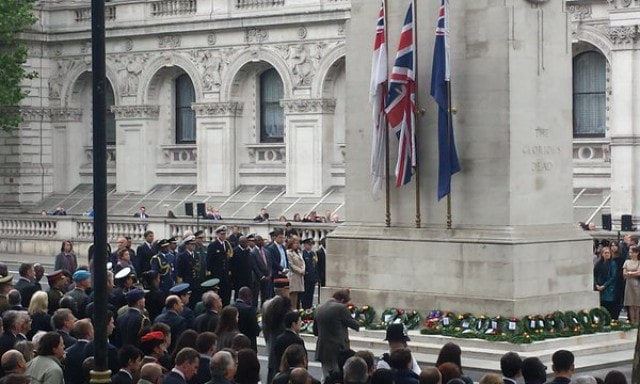
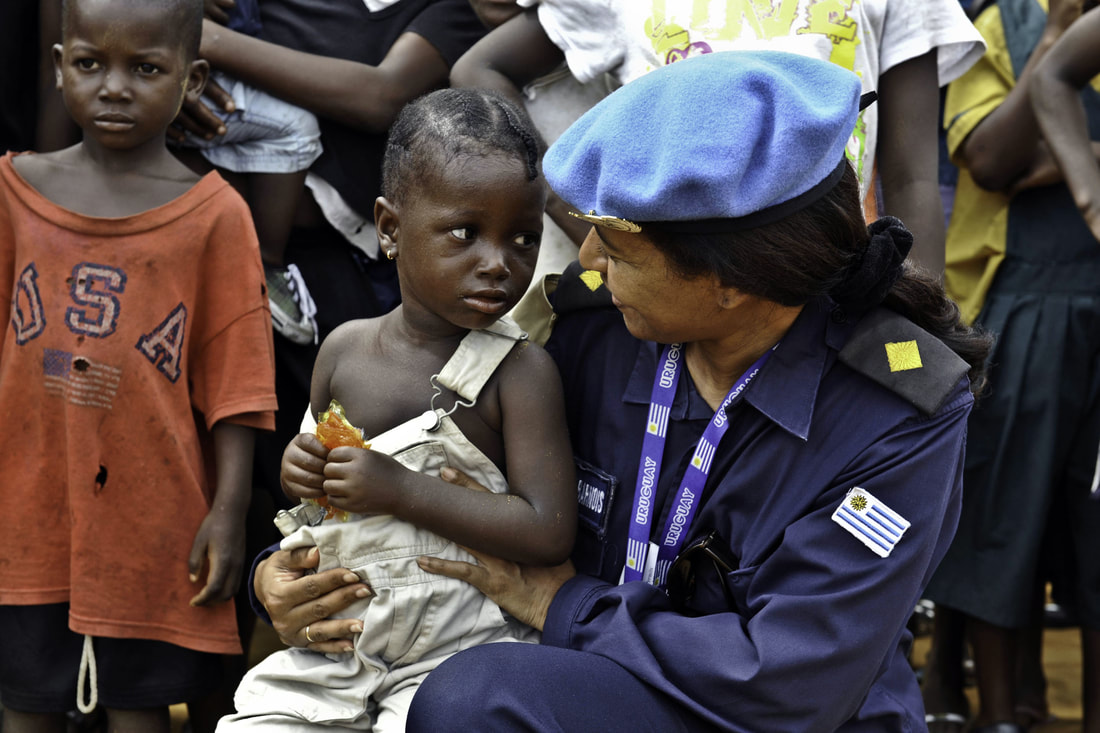
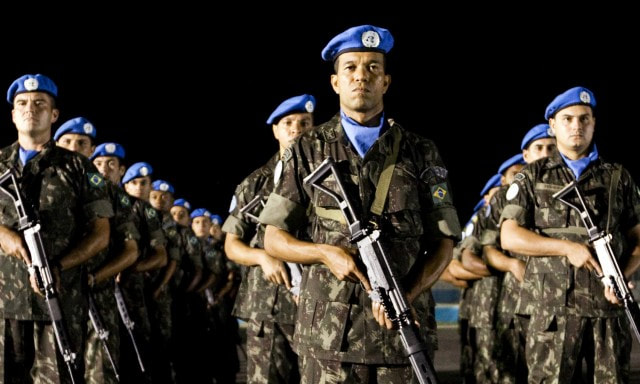
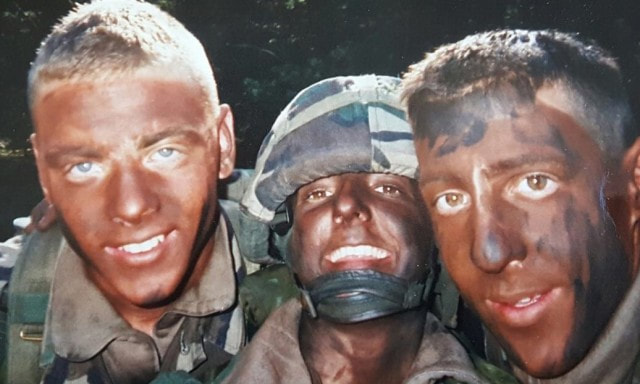
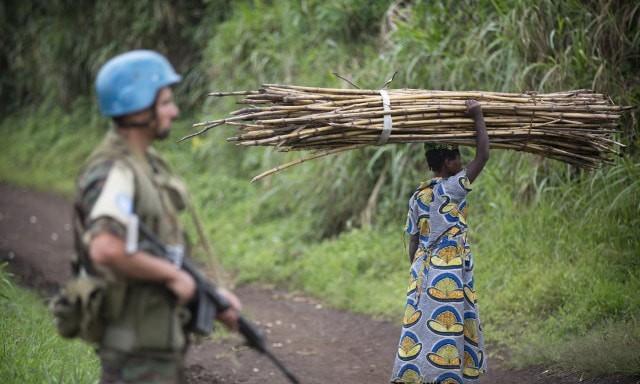
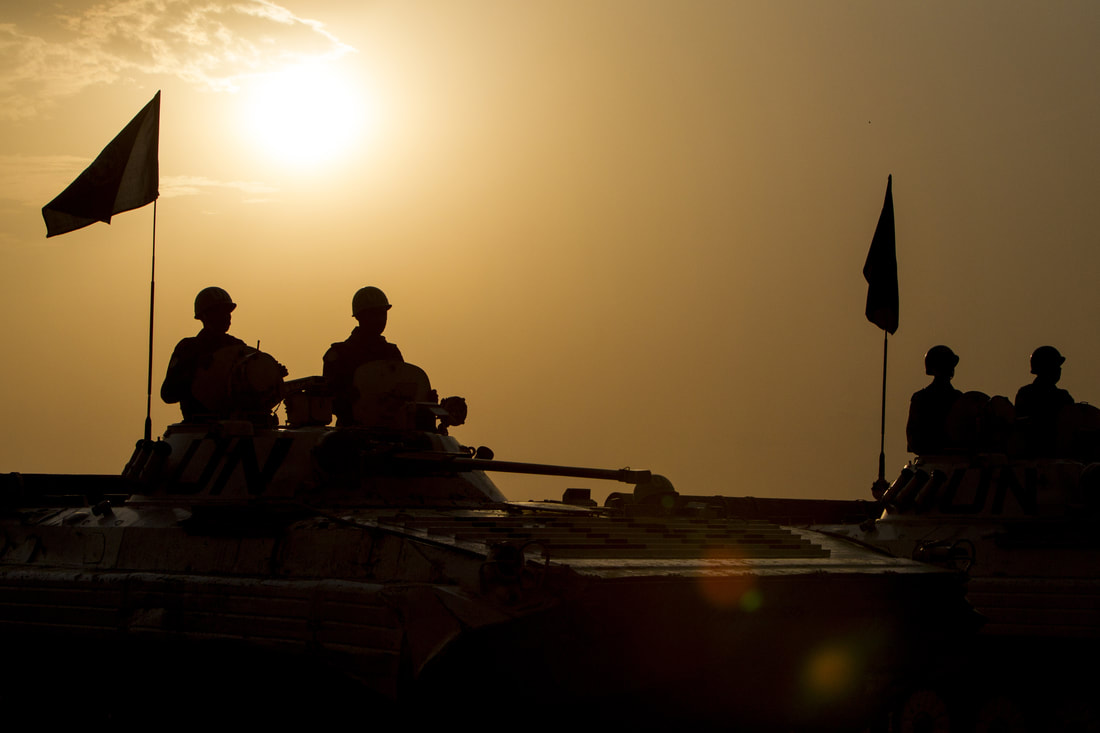
 RSS Feed
RSS Feed
